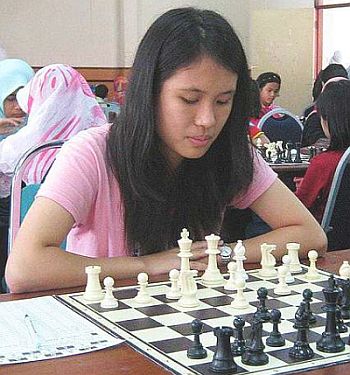New development augurs well for local chess scene.
IN a development rather unprecedented for Malaysian chess, I have just learnt that all the places in this year’s national closed and national women’s closed chess championships from March 16-20 may have been completely filled by now.
If you are still dithering over whether or not to play in either of the two competitions, your best chance is to give the organisers a call and enquire directly from them.
The Malaysian Chess Federation (MCF) is the organiser of both events. They had allowed only 110 places collectively for the two competitions but a frenzy of entries received before last Sunday’s deadline for a 20% discount on the entry fees meant that the places were quickly filled up.
That, by itself, is quite an achievement. Chess players are known to be procrastinators with their time. Who was it that once wrote about the relationship between work and time?
Ah, yes, Cyril Northcote Parkinson. You may have heard of him. Parkinson, a history professor at the University of Malaya in Singapore from 1950 to 1959, was fond of poking fun at government bureaucracies and in 1955 published a humorous article that quickly became labelled as Parkinson’s Law.
All that Parkinson’s Law said was that “work expands so as to fill the time available for its completion.”
Now, just substitute “chess” for “work” and don’t you think that this statement also applies to chess? Beating deadlines is the name of the game, otherwise why are chess games played with chess clocks?
Of course, to ensure that the players get into a time scramble! (A chess clock is a double-faced clock that counts down the time that a chess player has for his remaining moves. It used to be that players dreaded the dropping of the tiny flag at the 12 o’clock mark on the clock; nowadays, players dread the digital countdown to zero.)
Getting into time scrambles is second nature for serious chess players. That’s one of the delights of chess. Any chess player worth his salt should be a servant of the time scramble. Whether he is given five minutes, 30 minutes or 90 minutes to finish his game, he should make full use of this time to play. That’s the law of deadlines.
There is another deadline in chess, though not as potent as the time control, but still important enough for players not to ignore. And that is the deadline of registering for events and coughing up the entry fee.
Unfortunately, this deadline means little to some of them. In the past, even threats of penalty fees do not discourage people from turning up at the last minute and wanting to play. Chess organisers used to be so accommodating – an additional player means extra entry fee – to the extent that they would delay the start of their tournaments.
Fortunately, the situation has improved over the last few years. Late entries are less tolerated nowadays. I believe players now appreciate that tournaments need to start on time and end on time.
What I’ve learnt from this national closed and national women’s closed championships is remarkable. Players are actually registering and paying up before the closing date all because of a 20% discount. Penalty fees are no deterrent to chess players but discounts certainly are the carrots!
While looking through the list of entries, I’m heartened to see the continuing strong support from our women chess champions. Fong Mi Yen is joining the fray to defend the title that she won last year. Tan Li Ting and Alia Anin Azwa Bakri, the 2009 and 2008 champions respectively, have also entered the ring. With the trio in the national women’s closed championship, I should think it is going to be a good contest.
This is not to say that the national closed championship won’t be tight enough. Indeed, it has all the potential to be very competitive despite the absence of any former national champion or any of our titled players. On this point, I’m disappointed that Tan Khai Boon, Evan Timothy Capel and Edward Lee are not playing. The three of them would have added colour to the competition.
Nevertheless, it will still be an interesting race to the finish as the MCF has announced that the top eight players from the national closed championship will be included in a shortlist for selection to this year’s SEA Games in Indonesia. Likewise, too, the top eight women players will be among those shortlisted for selection to the women’s competitions at the SEA Games.

